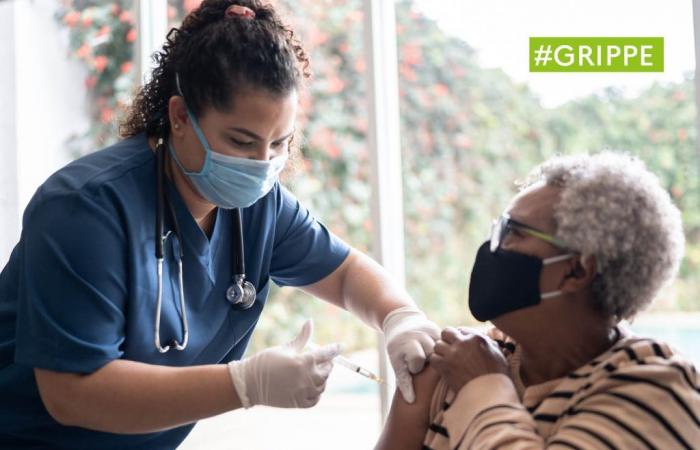Joint vaccination against seasonal flu and against Covid-19
The flu virus usually occurs from October to March. Because it changes every year, it is essential to protect yourself from it by vaccinating yourself every year. As the Covid-19 virus circulates during the same autumn period, it is recommended to be vaccinated against these 2 different viruses.
In order to limit consultations with the professional of your choice who will carry out the injections, it is recommended to carry out the vaccinations on the same day at 2 separate sites (for example, a vaccine in each arm on the same day). Long-standing vaccination experience shows that co-administration of several vaccines is not dangerous for the patient and does not compromise their effectiveness.
Furthermore, there is no particular time limit to be respected between the two vaccinations if they cannot be carried out on the same day.
Why get vaccinated?
In some cases, the flu can progress to serious complications that may require hospitalization or lead to death, particularly in people at risk. Complications of the flu mainly affect people aged 65 and over and people suffering from certain chronic diseases (cardiac, pulmonary, metabolic, etc.) or immunocompromised regardless of their age. Pregnant women also have an increased risk of respiratory complications.
On average, Public Health France estimates that around 9,000 to 10,000 deaths per year in France are directly or indirectly attributable (superinfections, decompensation of chronic diseases) to influenza (study period: 2011-12 to 2019-20) . More than 90% of people whose death is attributable to the flu are aged 65 or over, and therefore eligible for vaccination. Although it does not always prevent the disease, vaccination reduces the risk of serious complications or death.. It is estimated that influenza vaccination would prevent more than 2,000 deaths on average each year.
Since 2019, we have witnessed successive waves of Covid-19 epidemics linked in particular to the appearance of new variants. According to the WHO, more than 38.5 million infections and more than 160,000 deaths are attributable to these viruses. Here too, serious cases mainly affect the most vulnerable: among the reports of serious cases of Covid-19 admitted to intensive care, more than 60% were aged 65 and over. Among the cases for which the vaccination status was provided, 93% had not been vaccinated against Covid-19 for less than 6 months (Public Health France data).
Vaccination against seasonal flu and against Covid-19: for whom?
Vaccination is one of the most effective ways to protect vulnerable people against the flu.
The people targeted by vaccination against Covid-19 are the same as those targeted by flu vaccination recommendations. However, people with psychiatric disorders, dementia or Down syndrome are also targeted for vaccination against Covid-19 only.
Therefore, vaccination is strongly recommended for the following people:
- People aged 65 and over;
- Pregnant women (from the first trimester of pregnancy);
- People, including children aged 6 months and over, with certain chronic illnesses or who are immunocompromised;
- Obese people with a body mass index greater than or equal to 40;
- People staying in a follow-up care establishment or in a medico-social accommodation establishment;
- Those around infants under 6 months at risk of serious flu;
- The entourage of immunocompromised people;
- Professionals in regular and prolonged contact with people at risk of severe influenza;
- Cabin crew of cruise ships and airplanes and travel industry personnel accompanying groups of travelers (guides), as well as professionals in the pig and poultry sectors (in order to avoid the emergence of new influenza viruses) .
People not targeted by the recommendations can be vaccinated against the flu at their own expense. This vaccination can also be offered to all children aged 2 to 17, in accordance with the opinion of the High Authority of Health (HAS).
How to get vaccinated?
The flu vaccine, as well as that against Covid-19, can be carried out by a doctor, but also by a nurse, a pharmacist or a midwife whose skills have recently been broadened. Pharmacists and nurses can prescribe and administer all vaccines in the vaccination schedule, from the age of 11, with the exception of live attenuated vaccines in immunocompromised people.
Several regulatory texts should soon expand the skills of community pharmacists, midwives and nurses in matters of vaccination against Covid-19 in common law (excluding exceptional measures provided for by the provisions relating to the state of emergency health and which still apply to this day pending future repeal).
Thus, the pharmacists and nurses will be able to prescribe and administer the vaccine against Covid-19 to people aged 5 years and overtargeted or not targeted by the recommendations.
The flu vaccine
For the 2024-2025 vaccination campaign, 3 influenza vaccines are available: Vaxigrip Tetra®, Influvac Tetra®et Fluarix tetra®.
The flu vaccine is 100% covered for people at risk, those targeted above, and reimbursed at 65% for children aged 2 to 17. The people concerned receive a health insurance voucher which allows them to collect the vaccine free of charge from the pharmacy.
The Covid-19 vaccine
The Covid-19 vaccine can be given at least 6 months after the last injection or infection. This period is reduced to 3 months for immunocompromised people.
The vaccination schedule is simplified for people over 5 years old, regardless of vaccination status: only one dose of vaccine is administered. Children aged 6 months to 4 years who have not been vaccinated and have no history of infection will receive 3 doses (the first 2 doses spaced 21 days apart and the 3rd dose, 8 weeks after the second dose). .
The health authorities recommend, for this season, the preferential use of the mRNA vaccine adapted to the circulating JN.1 variants. To find out more about vaccines against Covid-19.
The Covid-19 vaccine is 100% covered for everyone.






